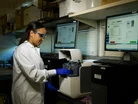Hologic: How Can Technology be Harnessed to Combat Cancer?

Even though national screening programmes for both breast and cervical cancer have made notable improvements to cancer detection and survival rates, it’s now time to consider how they can be made more efficient and effective.
A report by the World Health Organisation reports that “a majority of countries do not adequately finance priority cancer and palliative care services, as part of universal health coverage (UHC).” Around one in five people develop cancer during their lifetime, with breast, lung and colorectal being the most common.
In the UK, the NHS has set ambitious goals to improve women’s health, such as the elimination of cervical cancer by 2040. However, to achieve this, adopting innovative strategies and integrating cutting-edge technologies to facilitate early detection, improve diagnosis, and ultimately, save lives, is imperative, believes Tim Simpson.
Tim joined Hologic in 2019 as UK Country Business Manager, before becoming Hologic UK and Ireland’s General Manager in February 2022. He sat down with Healthcare Digital to discuss how crucial technology implementation is to reducing cancer, and took a specific look at the goals set by the NHS in the UK.
How can technology be used to boost efficiency to reduce breast cancer?
In the UK, breast cancer is the most common form of cancer, and reducing breast cancer rates and improving outcomes requires a multifaceted approach from the NHS, focusing on prevention, early detection, treatment and support. Beyond continuing the important work of raising awareness, education and making screening programmes more accessible, investing in the next generation of technology is how we move the needle in bettering outcomes for women.
Advancements in technology, particularly the introduction of artificial intelligence (AI) and 3D mammography, have the potential to transform breast cancer screening.
3D mammography, also known as tomosynthesis, allows healthcare professionals to detect abnormalities with significant accuracy and efficiency, enabling earlier intervention and personalised treatment plans.
Studies have demonstrated the superiority of 3D mammography over traditional 2D methods, significantly increasing cancer detection of up to 65% more invasive breast cancer. Using advanced technologies for breast cancer screening would help provide the reassurance that women deserve.
Moreover, implementing risk stratification by determining each woman's risk of breast cancer and giving priority to those who are deemed at high risk is essential to increase the efficiencies and effectiveness of the healthcare system.
Breast density, a known risk factor for breast cancer, can complicate the interpretation of mammograms and increase the likelihood of missed diagnoses. By leveraging AI algorithms to analyse various risk factors, including breast density, age, genetic predispositions, healthcare providers can offer targeted screening and advise on preventive measures for women who are at high-risk.
However, the use of tomosynthesis results in an increase in the number of images that radiologists need to review, which may lead to increased time needed to scroll through them, eye fatigue and concentration affecting diagnostic accuracy.
Nonetheless, to resolve this challenge, there are AI imaging solutions to compress the number of images to review at the point of care by 66%, leading to average interpretation time savings of one hour per day, based on eight hours of image interpretation time. Such optimisation of time could allow radiologists to read 15% more cases per hour.
What does the NHS need to do to meet its goal of eliminating cervical cancer by 2040?
The NHS's goal of eliminating cervical cancer hinges on comprehensive vaccination and screening programmes. Vaccinations against human papillomavirus (HPV), the primary cause of cervical cancer, have proven instrumental in preventing the development of this disease.
Through widespread vaccination campaigns targeting adolescents, we can significantly reduce the incidence of HPV infections and subsequent cervical cancer cases. For example, Scotland has demonstrated this in a recent study, where no cases of cervical cancer were detected among women who received full vaccination against HPV.
Furthermore, the integration of advanced technologies such as AI into cervical cancer screening processes holds immense promise in enhancing the accuracy and efficiency of cytology analysis. This will ultimately lead to earlier treatment and thus better patient outcomes. For example, digital cytology is a deep learning-based AI algorithm with advanced volumetric imaging technology to identify pre-cancerous lesions and cervical cancer cells.
Using AI to review diagnostic material enables cytotechnologists and pathologists to increase their efficiency without compromising accuracy. In turn, women benefit from more accurate results, fewer recalls and timely intervention.
To combat these common cancers and improve women’s health, it's crucial to invest in these advanced technologies, infrastructure and training healthcare professionals, as well as to foster collaboration between industry stakeholders and policymakers.
By embracing innovation and adopting a proactive approach, we can enhance early detection, reduce the burden on healthcare systems, and ultimately, improve outcomes for women.
**************
Make sure you check out the latest industry news and insights at Healthcare Digital and also sign up to our global conference series - Tech & AI LIVE 2024
**************
Healthcare Digital is a BizClik brand
*************
- NHS: Can AI & Robots Help Spot Early Stages of Lung Cancer?Technology & AI
- Roche: Making Preventative Healthcare Accessible to AllMedical Devices & Pharma
- Nestlé & Novo Nordisk: This Week's Top Healthcare StoriesTechnology & AI
- Johnson & Johnson: Transforming Medicine with NLPMedical Devices & Pharma




